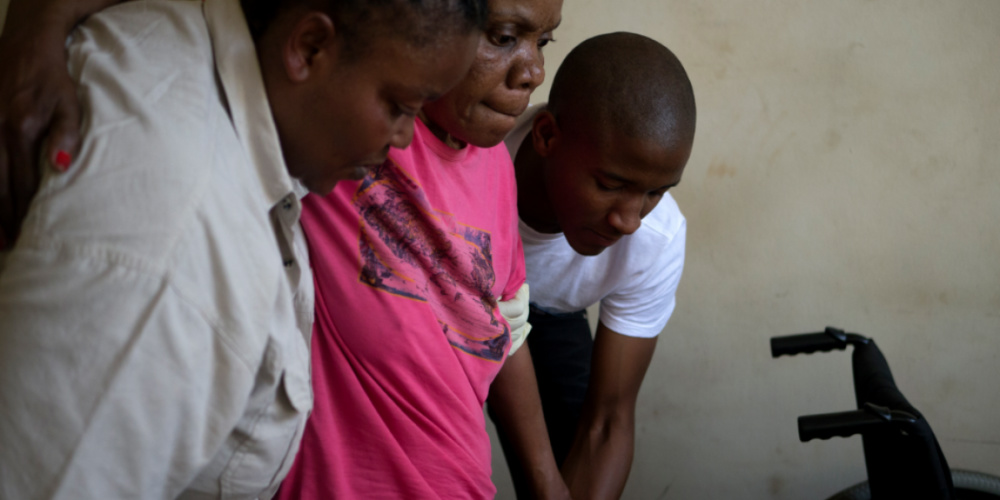Harare, Zimbabwe
Religion Unplugged
Catholic organisations are stepping up efforts to assist migrants returning to Africa as southern African countries – including Zimbabwe, Zambia, South Africa and Malawi – relax COVID-19 restrictions and open up land borders.
In some countries, strict lockdowns worsened hunger and joblessness, threatening asylum seekers and citizens returning from abroad with starvation.

Estelle, an asylum seeker from the DRC living in Johannesburg, walks assisted by Head Nurse Marceline and a Jesuit Refugee Service volunteer. PICTURE: Jesuit Refugee Service.
“In Malawi for instance, many returnees arrive without the basics,” said Dyna Khonde, emergency program manager for Catholic Relief Services in Malawi. Catholic Relief Services has provided meal assistance to more than 700 returned migrants. “We are also building testing shelters at the border so people can maintain their privacy and dignify while being tested.”
Many migrants from Africa, where some regions have faced worsening economic prospects owing to the devastating effects of successive droughts and Cyclone Idai in 2019, had sought better employment prospects in South Africa. Others traveled as far as the United States, Europe, the Middle East and China.
In the Southern Africa region alone, the International Organization for Migration estimates there are about 7.9 million migrants in the 16 countries of the Southern African Development Community, an inter-governmental organization.
The outbreak of COVID-19 into a pandemic meant that many economic opportunities for these African migrants dried up, forcing them back home. Some are legal residents of their new countries, but after job losses, feel forced to return to their birth places for support.
And with governments already struggling with other domestic issues, most of these returning migrants found themselves in difficult and sometimes desperate situations. In Malawi for example, a shift in political power and court-ordered election after a manipulated vote has exacerbated economic uncertainty due to the pandemic. It’s the latest in a string of economic difficulties that have over the years pushed many Malawians into neighboring countries.
Many migrants returned to poor, crowded conditions in quarantine centers and found their communities shunning them. Earlier in the pandemic, returnees in Malawi and other African countries such as Zimbabwe were escaping from quarantine centers, violating the quarantine rules set by the government.
Zimbabwe has now relaxed these measures as infections slow down, and returnees can quarantine at home if they test negative for COVID-19 on arrival. Zimbabwe and Botswana re-opened land borders on 1st December. Most of the African countries re-opened airports earlier in the fall to facilitate tourism, which is a key foreign currency earner for the region. It is now a requirement across southern Africa that arrivals present COVID-19 negative test certificates at ports of entry.
In East Africa, the Jesuit Refugee Service told Religion Unplugged that COVID-19 “has brought crippling needs to the already desperate situation of the refugees & asylum seekers” in the region. Any assistance by church groupings has also been partly affected by restrictions on religious gatherings in countries.
But as Andre Atsu, Jesuit Refugee Service regional director for East Africa said, strict lockdowns worsened hunger and malnutrition and many asylum seekers and refugees who lost their jobs in the informal sector face starvation. The Jesuit Refugee Service has provided basic need items like toiletries and food, special diet food for special needs children, mental health support through phone lines and financial help for rent and medical bills.
In Tanzania, the Jesuits are also working through the JRS to assist returnees “to reintegrate in society” after years in exile.
It is expected that COVID-19 infections will increase as people move across regional borders. Between 1st April and 31st August, as many as 17,732 Zimbabwean migrants returned from neighboring countries, the United Nations Office for the Coordination of Humanitarian Affairs reported recently. About 989 of the Zimbabwean returnees were still in quarantine at the end of August.
“The number of reported returnees continues to increase daily, with a projection of 20,000 new arrivals in the next coming months with inclusion of those from northern countries such as Zambia, Malawi, Tanzania and Ethiopia,” the OCHA said in a report.






